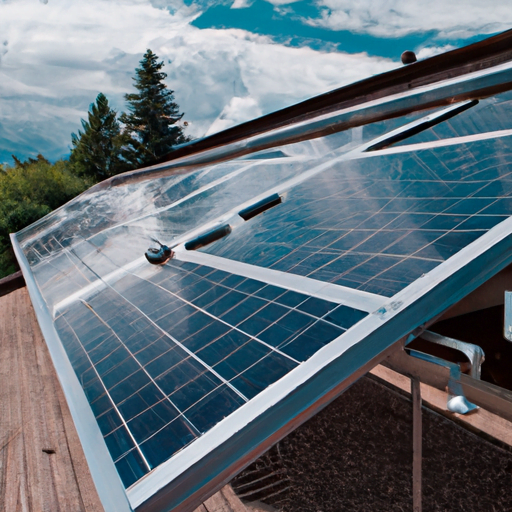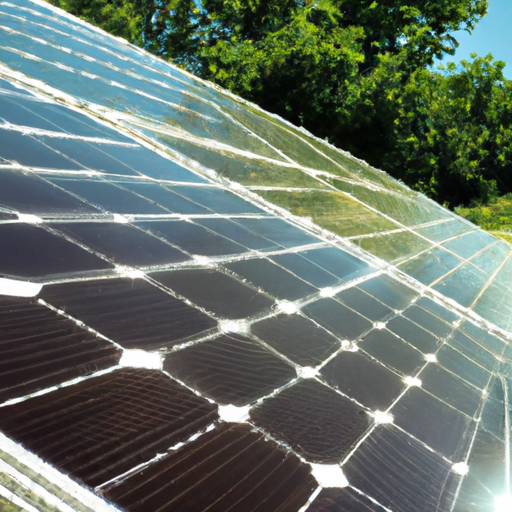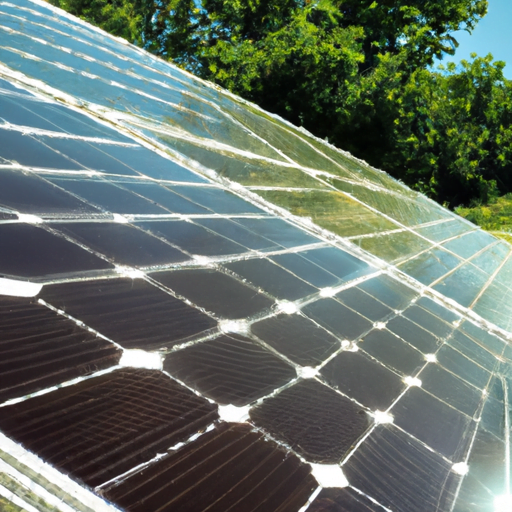So, have you ever thought about living off the grid? No power bills, no reliance on the electrical grid, just pure independence. It sounds pretty tempting, right? Well, if you have, then you’ve probably also considered using solar power as an alternative energy source. But here’s a question for you: can you use solar power without batteries?
Well, the short answer is yes, you can. While batteries are commonly used in solar power systems to store excess energy for later use, there is another option available: battery-free solar power systems. These systems, also known as direct-coupled solar systems, allow you to use the power generated by your solar panels directly without the need for expensive battery storage.
In a direct-coupled system, the energy generated by the solar panels is consumed as it is produced. This means that during the day, when the sun is shining and the panels are producing electricity, you can use that power to run your appliances, charge your devices, or even power your entire home. Of course, this type of system has its limitations, as it relies on the availability of sunlight during the day and doesn’t provide power during the night or on overcast days. But don’t worry, there are ways to work around these limitations, and we’ll explore them further in our upcoming article. Stay tuned to learn more about battery-free solar power systems and how they can revolutionize your off-grid living experience!
Living off grid
Living off grid refers to the concept of living in a self-sustainable manner, without relying on traditional utility services such as electricity, water, and gas. It involves generating and managing your own energy, collecting and conserving water, and creating systems for waste management. The idea behind living off grid is to reduce one’s carbon footprint, be self-sufficient, and live in harmony with nature.
The concept of living off grid
Living off grid is not a new concept, but it has gained popularity in recent years due to the increasing concern for the environment and the desire for energy independence. By disconnecting from the electrical grid and relying on alternative sources of power, such as solar energy, individuals can reduce their reliance on fossil fuels and decrease their impact on the environment.
Living off grid requires careful planning and consideration. It involves choosing the right location, installing the necessary equipment, and adopting a sustainable lifestyle. Many off-grid households rely on renewable energy sources such as solar power to meet their energy needs.
Advantages of living off grid
Living off grid offers several advantages. One of the major benefits is the ability to generate your own clean and renewable energy. Solar power systems, in particular, offer a sustainable and reliable source of energy. By harnessing the power of the sun, you can produce electricity without contributing to greenhouse gas emissions.
Another advantage of living off grid is the opportunity to become self-sufficient. By producing your own power and managing your own water supply, you are no longer dependent on utility companies. This can lead to increased resilience and independence, especially in remote areas where access to traditional utility services is limited.
Living off grid also allows for a more cost-effective lifestyle. While there is an initial investment in setting up a solar power system or other off-grid infrastructure, the long-term savings can be significant. By reducing or eliminating monthly utility bills, individuals can save money and allocate their resources towards other necessities or investments.
Challenges of living off grid
Living off grid is not without its challenges. One of the main challenges is the initial cost of setting up an off-grid system. Solar power systems, batteries, and other necessary equipment can be expensive. However, it is important to consider the long-term savings and environmental benefits that can be achieved.
Another challenge is the need for regular maintenance and monitoring of off-grid systems. Solar panels may require cleaning and occasional repairs, and batteries need to be properly maintained to ensure longevity. Additionally, living off grid may require a lifestyle adjustment, as energy conservation practices and efficient resource management become essential.
Lastly, living off grid may limit access to certain modern conveniences. If you choose to disconnect from the grid completely, you may need to forgo certain appliances or technologies that require a constant supply of electricity. However, advancements in technology are continually making off-grid living more feasible and convenient.

Introduction to solar power systems
Can you use solar power without batteries? The answer is yes. While batteries are commonly used to store excess solar energy for later use, there is an alternative approach known as battery-free solar power systems.
Understanding solar power
Solar power is a renewable energy source that harnesses the energy from the sun and converts it into electricity. This is achieved through the use of solar panels, which contain photovoltaic cells that absorb sunlight and generate an electrical current. Solar power is clean, abundant, and widely available, making it an attractive option for off-grid living.
Components of a solar power system
A typical solar power system consists of several components. The main component is the solar panel, which is responsible for converting sunlight into electricity. The electricity generated by the solar panels then flows into an inverter, which converts the direct current (DC) electricity into alternating current (AC) electricity, suitable for household use. The AC electricity is then distributed to the various electrical appliances and devices in your home.
Types of solar power systems
There are two main types of solar power systems: grid-tied and off-grid. Grid-tied systems are connected to the electrical grid and allow for the transfer of excess electricity back to the grid. Off-grid systems, on the other hand, are not connected to the grid and require some form of energy storage to meet the electrical demands when there is no sunlight.

Overview of battery-free solar power systems
Battery-free solar power systems offer an alternative to traditional battery-based systems. These systems rely on immediate energy consumption, rather than storing excess energy in batteries for later use. In a battery-free system, any excess energy that is not immediately consumed is essentially wasted.
What are battery-free solar power systems?
Battery-free solar power systems are designed to maximize energy consumption during daylight hours while minimizing energy waste. Instead of storing excess energy in batteries, these systems divert any surplus energy to other applications, such as heating water or powering appliances directly, while the sun is shining. Battery-free systems are particularly suited for areas with consistent sunlight or for applications with high energy demands during daylight hours.
Working principle of battery-free solar power systems
The working principle of battery-free solar power systems is relatively straightforward. When the sun is shining, the solar panels generate electricity, which flows into the inverter. The inverter converts the electricity from DC to AC, which can then be used to power household appliances or devices. Any excess electricity that is not immediately consumed is either diverted to secondary uses or wasted.
Battery-free systems often incorporate load management techniques to ensure that the energy produced by the solar panels is efficiently utilized. This may involve using programmable logic controllers or smart switches to prioritize the energy consumption of certain appliances or devices based on their energy demands and the available solar power.
Benefits of battery-free solar power systems
There are several benefits to using battery-free solar power systems. One of the main advantages is the elimination of the need for batteries, which can be expensive and require regular maintenance. Battery-free systems also tend to have higher overall system efficiency since there is no energy loss associated with the charging and discharging of batteries.
Another benefit is the reduced space requirement. Battery-free systems eliminate the need for bulky battery banks, allowing for smaller and more compact system designs. This can be especially advantageous for off-grid applications where space is limited.
Battery-free systems are also more sustainable and environmentally friendly. By eliminating the need for batteries, the overall system becomes more streamlined and reduces the environmental impact associated with battery production and disposal.
In conclusion, living off grid and exploring battery-free solar power systems offer an alternative and sustainable approach to energy generation and consumption. By utilizing the power of the sun, individuals can reduce their carbon footprint, become more self-sufficient, and minimize their reliance on traditional utility services. While there are challenges to living off grid and using battery-free systems, advancements in technology and growing environmental awareness are making it increasingly feasible and appealing. So, are you ready to embrace the battery-free solar power revolution and embark on a greener and more sustainable lifestyle? The choice is yours.




